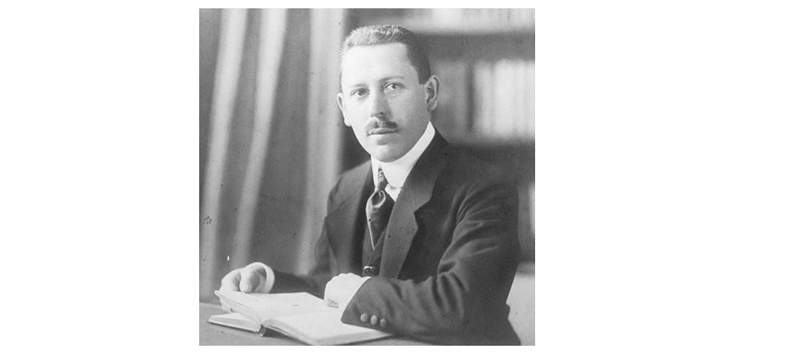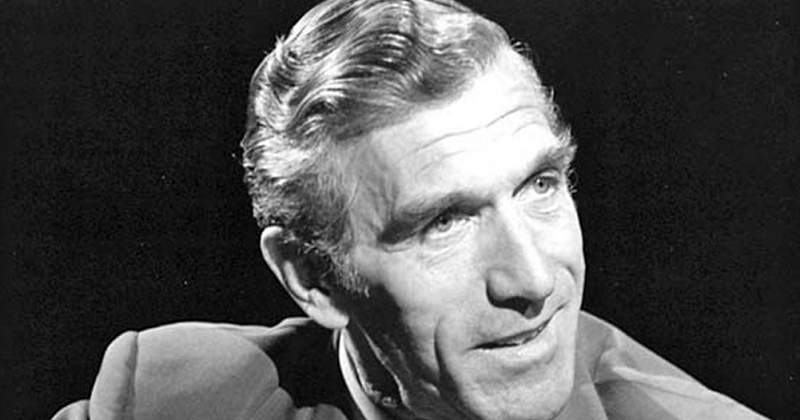Karl Abraham Biography (1877-1925)

- 4029
- 1136
- Kristopher Greenholt
Karl Abraham (1877 - 1925) was an influential German psychoanalyst and collaborator of Sigmund Freud, who called him his "best student". He is considered one of the most important pioneers of psychoanalysis. He made important theoretical contributions to the psychology of sexuality, the development of character, manic-depressive disorders and symbolism.
Content
Toggle- Karl Abraham first years
- Abraham and psychoanalysis
- Abraham works
- Contributions to psychoanalysis
- Libido and character
- Pass or not to pass the stages
- Mood disorders
- Other contributions from Karl Abraham
- Conclusions
- Bibliography
Karl Abraham first years
He was born within a Jewish family in Bremen, Germany. Since childhood suffered a slight asthma. He studied medicine in Würzburg, Berlin and Freburg. What aroused its greatest interest was biology, which was later reflected in its Contribution in the child development of sexual instincts and their effects on the adult agency. After completing his medical studies, he became deeply interested in philology and linguistics. He spoke German, English, Spanish and Italian fluidity, and was able to express himself in Danish, Dutch, French and Latin, he also read Greek tragedies in the original language.
From 1901 to 1904 Abraham was an assistant in the municipal asylum of Berlin, where he investigated several aspects of aphasia, apraxia, paresis and delirium induced by drugs. His psychiatric interests changed completely when he became an assistant to the famous Eugen Bleuler at the Burghölzli mental hospital in Zurich in 1904. Here Abraham met Jung and familiarized Freud's writings.
Abraham and psychoanalysis
His first psychoanalytic article presented in 1907 was entitled "über Die Bedeutung Sexueller Jugendräumen Für Die Symptomatologie der Dementia Praecox" ("On the importance of sexual trauma in childhood for the symptomatology of early dementia"). Abraham was Freud's favorite disciple and was always faithful to Freud and his classic psychoanalysis principles. A deep friendship with Freud began in 1907 and lasted until Abraham's death.
Abraham was the first psychoanalyst in Germany, where a huge rise of this psychological current was generated. His clinical-theoretical contributions quickly became classics that have powerfully influenced the development of psychoanalytic theory. He was the first to develop a psychoanalytic theory of depression, Several years before Freud's publication, "mourning and melancholy". Abraham was supervisor and analyst at Melanie Klein, in whose theoretical work she had a deep influence.
He was president of the International Psychoanalysis Association, president of the Berlin Psychoanalytic Society and a member of the "Secret Committee". During World War I was a boss psychiatrist in a German army hospital in Eastern Prussia. His experiences led to a Joint publication on war neurosis With Freud, Ferenczi, Ernst Simmel and Jones. During the war years, Abraham contracted dysentery and never recovered completely. In 1925 he got sick of pneumonia and concomitant complications and died seven months later.
Those who met Abraham during their early years as a psychoanalyst repeatedly commented on tenacity, courage and joy with which he faced the opposition. I was dedicated to his work, sure of himself and seemed completely free of ambivalence and hate. Ernest Jones described him as "happily reasoning with someone who was frowning with anger and resentment, apparently gently ignoring the emotion and full of hope that a silent exhibition would change the situation" (Jones [1926] 1953. 39).
 Biography of Paul Ekman (1934)
Biography of Paul Ekman (1934) Abraham works
Abraham was a pioneer in the treatment of psychoanalyst psychosis And a theorist who remained closer to clinical observations than most of his colleagues. He was one of the least prolific writers among psychoanalysts of his generation: he wrote 49 articles, many very short and 4 quite short books, a total production of less than 700 pages. All but the first 8 articles treated psychoanalytic problems. Three of the books were about Dreams and myths (1909), Libido and manic-depressive disorders (1924), and Personality formation (1925). The second of these books is considered its most important contribution. His fourth book was a collection of clinical articles originally written between 1907 and 1920.
"Karl Abraham famous phrases"
Contributions to psychoanalysis
Libido and character
Abraham contributed mainly to Libido analysis and its relationship with character formation. It was based on the hypothesis that libido develops through six stages: the first two are oral, the next two annals and the last two genitals.
- In the first oral stage, to suck, the baby does not distinguish between him and the objects he incorporates. It has no object and is free of ambivalence. The posterior oral stage is one of "canibalism" scathing, in which the baby incorporates objects to destroy them. Becomes ambivalent and remains like this during the subsequent anal and phallic stages.
- The Anal periods They include a hostile, anal-expulsive stage, followed by a more controlled and analretentive stage.
- The phallic stage, o First stage of genitality, is marked by the Appearance of love for objects in a clearer way than in anal phases. Finally, the genital stage adult, Reached only by individuals who are able to avoid psychotic or neurotic fixations in earlier stages, it is distinguished by the love of post -environmental objects.
This development scheme was not complete. Abraham He resolved the stages more deeply than Freud, and also linked the oral and anal stages closer to the character's posterior development.
Pass or not to pass the stages
According to Abraham At any stage of development, the baby can feel satisfied and move on to the next stage of development, or frustrated or private and remain in a stage of development. When there is frustration, it manifests itself through a fixation, which is the defensive persistence of a pattern of behavior of a development stage, or a reaction formation, which would be the defensive reinforcement of a repression by behavior directly opposite to the trend unconscious.
Thus, depending on the events that occur during the oral period, the individual can develop traits such as permanent optimism, emotional dependence, restlessness, or sarcastic and scathing envy. Gratification in the initial stage of orality leads to sociability, curiosity and accessibility to new ideas. The Fixation in the oral-sedic stage It is indicated by malice and hostility.
Anal fixations They are represented in the features of bad mood, reluctance, inaccessibility to new ideas, Conservative resistance to innovation, perseverance, delay and hesitation, in summary, the reverse of many of the oral features. Anal expulsion is present in sadism; Anal retention in the tacañería, order, pleasure in material possessions, the stubborn challenge (or a reaction formation that results in submission), inability to delegate responsibilities to others or share activities with them, and underestimate others.
The pleasure that an anal individual feels when contemplating his own mental products, for example, letters and manuscripts, has as a prototype the childish pleasure of looking for his own feces. The anal individual can collect useless pieces and objects and then, on some occasion, get rid of the lot in an expulsive gesture. Anal eroticism of the retentive type provides the characteristic basis for neurotic obsessions and compulsions.
Mood disorders
Karl Abraham's theory of manic-depressive disorders He focused on the twin concepts of libidinal fixing and ambivalence towards an object of love. In an article written in 1911 and published in 1912, he said that depression or melancholy (the terms are interchangeable in the current context) is a reaction comparable to pain for the loss of an object of love.
Depression is pain, as anxiety is fear. Just as anxiety occurs when the individual strives for the gratification of impulses, but it is prevented from achieving it through repression, depression occurs when a sexual objective must be renounced. The depressive libido retires narcissistily from the external world. Loses the ability to love and, therefore, feels hate in return. His self-humillation gives him a masochistic satisfaction and a hostile revenge against those who take care of him.
Abraham raised the hypothesis that An adult depression is preceded by primary depression in the phallic stage. Primary depression is an answer to repeated disappointments of love for a father, the predecessor of the object of love lost at a later time. Primary depression is itself a regression to orality, and subsequent depression is a repetition of this regression.
In summary, his theory considered depression as a recreation of past conflicts between oral receptive and aggressive impulses. There is Two types of depression: o The introjected image of the object is the recipient of reproaches (the type underlined by Freud), or the introjected image directs reproaches against the self.
Abraham considered that Maniac-depressive patients exhibit, during their lucid intervals, the same characteristics as patients with obsessive neurosis that are under control. These character traits were evidence, for him, that the two pathological conditions have a common psychological relationship with the anal-sedic organization of libido. The obsessive returns to the anal-retentive stage and the depressive to a previous one, a combination of anal orality and expulsion; The latter is indicated by the "expulsion" of the external world by depressive.
Although Abraham worked more with depression than with schizophrenia, or early dementia as it was called then, he believed that the concept of retreat of libid schizophrenia as depression. In A general introduction to psychoanalysis, Freud said that the abstinence concept of Abraham's libido was the basis of psychoanalytic position with respect to all psychosis.
 Biography of Paul Watzlawick (1921-2007)
Biography of Paul Watzlawick (1921-2007) Other contributions from Karl Abraham
Abraham also made several contributions lower than a variety of issues. In a document entitled "Manifestations of the female castration complex"(1921), It presented material to justify the application of the term "castration complex" both women and men, and elaborated its manifestations in the ideas, fantasies and wishes of women. He was the first analyst to call attention to the now familiar concept of the castrating female.
He described it as a "type of revenge" and hypothesized that his attempts to dominate men, reduce their power and then blame them for their own sexual disappointments were a cover for their unconscious masochistic tendencies. The self -destructive behavior of several other types of individuals was also explained as due to unconscious masochism.
Finally, he had some original comments to do about early ejaculation. He believed it was the result of fear of hurting women, which originated in repressed sadism. This in turn was due to disappointment in love for the mother and the consequent hostility towards her. The parallel to the explanation offered for depression is remarkable.
Conclusions
Although Karl Abraham's original work had a relatively restricted reach, continues to raise considerable interest many years after his death. They say he had an unusually liberal mind for that time.
Bibliography
- (1907) 1955 about the importance of sexual trauma in childhood for the symptomatology of early dementia. New York: Basic Books.
- (1907-1926) 1966 Freud, Sigmund; and Abraham, Karl. A psychoanalytic dialogue: Sigmund Freud and Karl Abraham, 1907-1926. Edited by Hilda C. Abraham and Ernst L. Freud. New York: Basic Books.
- (1909) 1955 dreams and myths: a study in popular psychology. Pages 151-209 at Karl Abraham, selected papers. Volume 2: Clinical documents and essays on psychoanalysis. New York: Basic Books.
- (1912) 1953 notes on psychoanalytic research and treatment of manic-depressive madness and related conditions. New York: Basic Books.
- (1921) 1953 manifestations of the female castration complex. Pages 338-369 in Karl Abraham, selected papers. New York: Basic Books.
- (1924) 1953 A brief study on the development of libido, seen in the light of mental disorders. Pages 418-501 in Karl Abraham, selected papers. Volume 1: Selected documents on psychoanalysis. New York: Basic Books.
- (1925) 1953 Character formation at the genital level of libido development. Pages 407-417 in Karl Abraham, selected papers. New York: Basic Books.
- Jones, Ernest (1926) 1953, introductory memory. New York: Basic Books.

